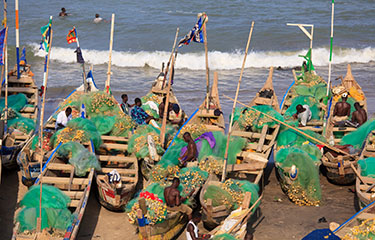On 2 March, Ghana announced its commitment to achieving 100 percent transparency across its commercial fisheries by 2025.
The announcement came less than a year after the European Commission issued a second yellow card to the West African nation, a warning that could result in the banning of its products from the European marketplace.
Ghana will install video cameras, remote sensors, global positioning systems, and electronic monitoring system hard drives on fishing boats to ensure activities are effectively monitored and valuable data collected. The Nature Conservancy said in a press release that as a result of the changes, fishery managers will be able to better identify what species of fish are caught and their total volumes.
“As the first West African nation to commit to 100 percent monitoring of all industrial fishing vessels, my administration is taking a bold position to improve transparency of fishing activity," Ghana Minister of Fisheries and Aquaculture Development Mavis Hawa Koomson said. "This will contribute to our aim to prevent, deter, and eliminate illegal, unreported, and unregulated fishing in Ghana. This will support our continuing efforts to provide a stable source of employment and livelihood to millions of Ghanaians who rely on our fisheries for domestic and international markets – for this to be sustained we must manage the resources responsibly and stop overfishing. Our hope is that this commitment will chart a new course towards better management in Ghana and inspire our neighboring African fishing nations to make transformative commitments as well."
The data will be beneficial for the government of Ghana in assurcing compliance with sustainable management policies and demands of the global supply chain for increased transparency, Koomson said. Thai Union, which in 2021 committed to 100 percent on-the-water monitoring of its international tuna supply chain by 2025, said it is supportive of Ghana's move.
“Thai Union fully supports the minister’s leadership in fisheries transparency and dedication for turning commitment into action. We fully support this commitment and have already been working on this in collaboration with the fishing vessels that we source from in Ghana,” Thai Union Group Director Global Fish Procurement Tony Lazazzara said.
By deploying EMS, the country will be able to reduce illegal catches, transshipment at sea of small pelagic species, and labor abuses onboard fishing vessels, according to Koomson. They will also provide vessel owners and processors with valuable operational data, she said.
“Simply put, you can’t manage what you can’t measure – and many countries are still effectively ‘flying blind’ when it comes to fisheries management,” The Nature Conservancy Large-Scale Fisheries Director Mark Zimring said. “Electronic monitoring creates the transparency that is key to both fisheries managers and consumers having confidence that their seafood has been harvested legally, sustainably, and without labor abuses.”
Feed the Future Ghana Fisheries Recovery Activity, funded by the U.S. Agency for International Development (USAID), said it is partnering with Ghana's Ministry of Fisheries and Aquaculture Development (MOFAD) anticipates to work with the country's commercial fishing sector on EMS trials on industrial trawl vessels beginning this year. Using results from the trials, MOFAD plans to scale-up EMS deployment to all licensed industrial vessels operating in Ghana’s waters by 2025.
Ghana aims to send an impactful message to African nations and markets across the world that a commitment to full fisheries transparency is “the best way forward for businesses, for people, and for the future of the oceans we all depend on,” The Nature Conservancy said in a press release.
Photo courtesy of Sura Nualpradid/Shutterstock







